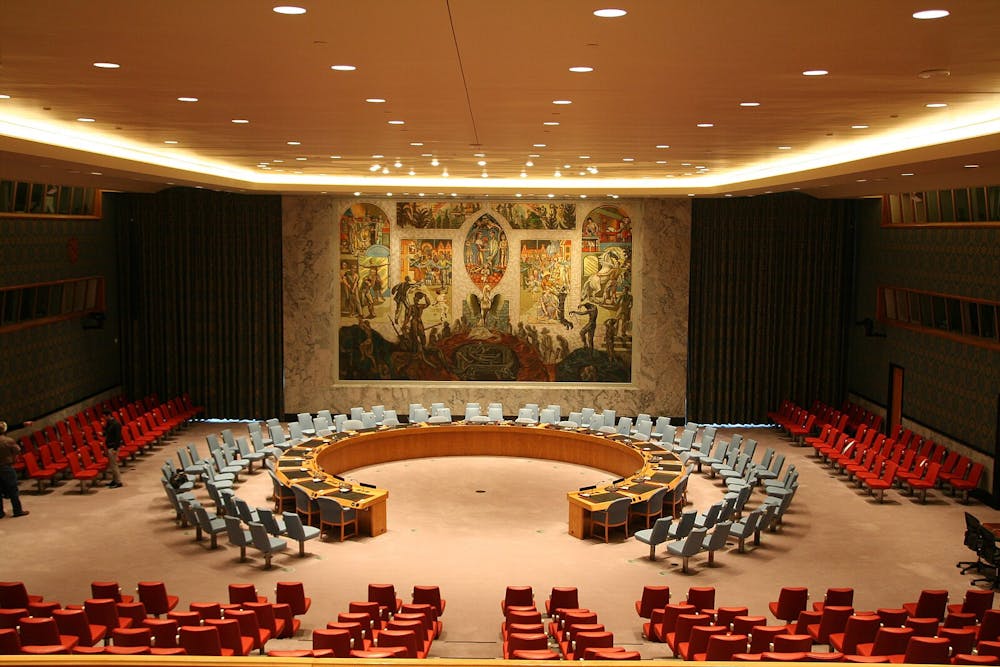By Rajika Chauhan
Staff Writer
The U.S. was the sole naysayer in a U.N. Security Council vote on Feb. 20 to produce a demand for a humanitarian ceasefire in the Israel-Hamas war. According to AP News, the vote stood 13-1, with the U.K. abstaining, putting an end to the Arab-backed call for a cessation of violence in the Gaza Strip and the provision of vital humanitarian aid to the region.
Since the war began following Hamas’ armed invasion of Israel on Oct. 7, the Gaza Health Ministry reports that more than 29,000 Palestinians have been killed, a product of Israel’s military assault against Hamas. The Israeli government has pledged itself to eradicating the presence of Hamas in the Palestinian territories.
The Security Council’s latest vote was the third since last November, none of which have won unanimous approval. The November vote called for a humanitarian pause and the provision of aid to Palestinian victims, with another December proposal reiterating the need for a ceasefire and faster aid deliveries, according to NPR. The most recent declaration was raised by the 22-member Arab council of the U.N. and demanded both the release of all Israeli hostages as well as a protection against the forced displacement of Palestinian civilians.
The declaration reiterates the need for a two-state solution, which is strongly contested by the Israeli government and Prime Minister Benjamin Netanyahu. AP News reports that the Israeli government is currently pushing to evacuate civilians from Rafah, where many Palestinians have taken refuge, and continue its offensive in the area nearing the Egypt border.
The proposal was widely supported by the U.N. member nations, with the U.S. breaking out as an exception with its issue of a veto in pursuit of an improved deal. The U.S. claims it is working on a proposal which will secure the release of remaining Israeli hostages while making provisions for a sustained ceasefire, and argues that this will be a more compelling package than the current Arab resolution.
U.S. Ambassador Linda Thomas-Greenfield aimed to offer some context to the decision, explaining that approving the current resolution would have hindered the improved deal on which the U.S. is currently working.
She explained that the U.S. deal would “do what this text does not — pressure Hamas to take the hostage deal that is on the table and help secure a pause that allows humanitarian assistance to reach Palestinian civilians in desperate need.”
The U.N. ambassador to Algeria, Amar Bendjama, strongly condemned the U.S.’s vote of disapproval in a statement.
“A vote in favor of this draft resolution is a support to the Palestinians right to life,” Bendjama said. “Conversely, voting against it implies an endorsement of the brutal violence and collective punishment inflicted against them.”
Palestinian U.N. Ambassador Riyad Mansour also spoke out against the U.S.’s vote: “It means that human lives that could have been saved are instead being forsaken to Israel’s genocidal war machine, deliberately, knowingly, by those who oppose a ceasefire.”
The U.S. has argued that accepting the Arab deal would prevent the establishment of a more permanent peace, offering a brief resolution without any incentive for the war to end, according to the New York Times. The release of hostages provided for in the U.S. plan would hold Hamas to a longer abstinence from violence.
Israeli Ambassador Gilad Erdan echoed sentiments from his government in his condemnation of the ceasefire proposal, ridiculing supporters for envisioning the declaration as “a silver bullet, a magical solution to all of the region’s problems.”
He argued that allowing a ceasefire to pass would give Hamas time to reorganize and rearm itself.
The next option for the Arab council is to turn its resolution over to the U.N. General Assembly, which would allow all 193 member nations to take a vote, according to AP News. The resolution is likely to be supported in this forum, but the General Assembly’s declarations are not legally binding, unlike those of the Security Council.
The U.S. resolution at this point calls for a ceasefire as soon as it becomes practical, depending on the arrangements made for the release of hostages. It is significant in that it represents the first usage of the term “ceasefire” in a U.S.-led initiative. The Biden administration has taken a turn in its approach towards the war in recent months, shifting from a strong backing of Israel to moves more critical of the government’s unmitigated assault against Palestinian civilians, according to the NYT. Specifically, the U.S. draft criticizes calls from Israeli ministers to resettle Gaza or issue territorial changes.
The issuing of the U.S. resolution in the coming weeks will be a test of the extent to which the Biden administration has changed its stance, and the key determinant of next steps in bringing a reprieve to a bloody and costly war.







